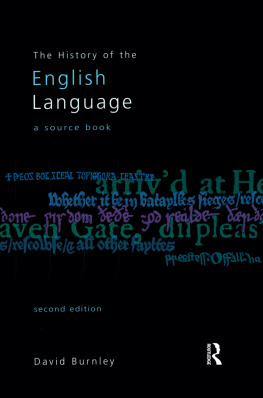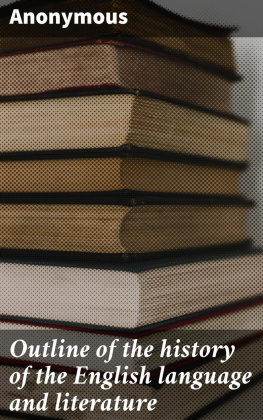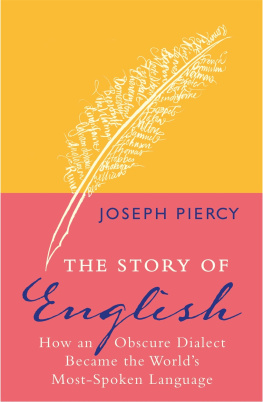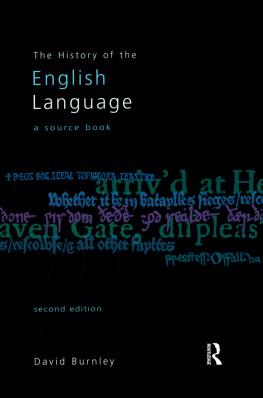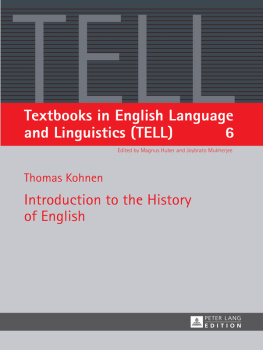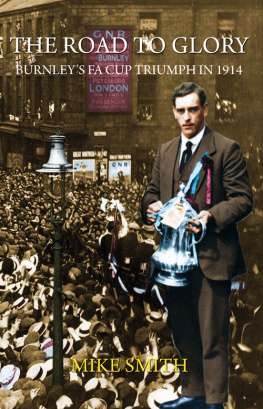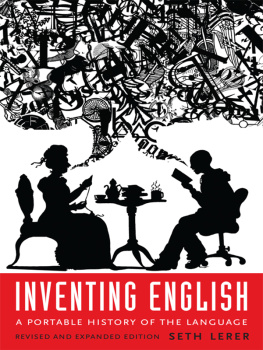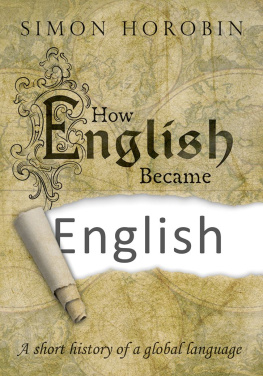Burnley - The History of the English Language
Here you can read online Burnley - The History of the English Language full text of the book (entire story) in english for free. Download pdf and epub, get meaning, cover and reviews about this ebook. publisher: Taylor and Francis, genre: Romance novel. Description of the work, (preface) as well as reviews are available. Best literature library LitArk.com created for fans of good reading and offers a wide selection of genres:
Romance novel
Science fiction
Adventure
Detective
Science
History
Home and family
Prose
Art
Politics
Computer
Non-fiction
Religion
Business
Children
Humor
Choose a favorite category and find really read worthwhile books. Enjoy immersion in the world of imagination, feel the emotions of the characters or learn something new for yourself, make an fascinating discovery.
- Book:The History of the English Language
- Author:
- Publisher:Taylor and Francis
- Genre:
- Rating:3 / 5
- Favourites:Add to favourites
- Your mark:
- 60
- 1
- 2
- 3
- 4
- 5
The History of the English Language: summary, description and annotation
We offer to read an annotation, description, summary or preface (depends on what the author of the book "The History of the English Language" wrote himself). If you haven't found the necessary information about the book — write in the comments, we will try to find it.
Burnley: author's other books
Who wrote The History of the English Language? Find out the surname, the name of the author of the book and a list of all author's works by series.
The History of the English Language — read online for free the complete book (whole text) full work
Below is the text of the book, divided by pages. System saving the place of the last page read, allows you to conveniently read the book "The History of the English Language" online for free, without having to search again every time where you left off. Put a bookmark, and you can go to the page where you finished reading at any time.
Font size:
Interval:
Bookmark:
The History of the English Language
SECOND EDITION
THE
History
OF THE
English Language
A source book
SECOND EDITION
DAVID BURNLEY

First published 1992 by Pearson Education Limited
Second edition 2000
Published 2013 by Routledge
2 Park Square, Milton Park, Abingdon, Oxon OX14 4RN
711 Third Avenue, New York, NY 10017, USA
Routledge is an imprint of the Taylor & Francis Group, an informa business
Copyright 1992, 2000, Taylor & Francis.
The right of David Burnley to be identified as author of this work has been asserted by him in accordance with the Copyright, Designs and Patents Act 1988.
All rights reserved. No part of this book may be reprinted or reproduced or utilised in any form or by any electronic, mechanical, or other means, now known or hereafter invented, including photocopying and recording, or in any information storage or retrieval system, without permission in writing from the publishers.
Notices
Knowledge and best practice in this field are constantly changing. As new research and experience broaden our understanding, changes in research methods, professional practices, or medical treatment may become necessary.
Practitioners and researchers must always rely on their own experience and knowledge in evaluating and using any information, methods, compounds, or experiments described herein. In using such information or methods they should be mindful of their own safety and the safety of others, including parties for whom they have a professional responsibility.
To the fullest extent of the law, neither the Publisher nor the authors, contributors, or editors, assume any liability for any injury and/or damage to persons or property as a matter of products liability, negligence or otherwise, or from any use or operation of any methods, products, instructions, or ideas contained in the material herein.
ISBN 13: 978-0-582-31263-0 (pbk)
British Library Cataloguing-in-Publication Data
A catalogue record for this book is available from the British Library
Library of Congress Cataloging-in-Publication Data
A catalog record for this book is available from the Library of Congress
FOR RICHARD
We are grateful to the following for permission to reproduce copyright material:
: Caxtons advertisement, Arch Ge 37, all used with permission from The Bodlian Library, Oxford.
: Troilus and Criseyde, CCC MS, f.27.r, The Parker Library, Corpus Christi College, Cambridge.
: Caxton: The Faytis of Arms, reproduced by courtesy of the Director and University Librarian, John Rylands University Library, Manchester.
: extract from Miltons Paradise Lost, by permission of Sheffield University Library.
(ii): from the Daily Courant (E922 PG 195) by permission of the British Library, London.
: Enos Fruit Salts used by permission of SmithKline Beecham, Brentford, Middlesex (intellectual property holders). Enos Fruit Salts is a registered trademark of Beecham Group plc.
: we have been unable to trace the copyright holders of this image, and would be grateful for any information that will enable us to do so.
We are indebted to Oxford & Cambridge University Presses for permission to reproduce extracts from New English Bible, Second Edition 1970.
A source book does not try to usurp the role of a fully explanatory and discursive history of the language, nor replace the information and advice which can be offered to the student by a teacher. It seeks only to make conveniently available to students and teachers alike a resource which can be used to illustrate the development, and something of the variety, of the English language used in Britain through nearly thirteen centuries.
A variety of purposes and levels of competence among the users of this book is foreseen. Some very early dialect texts and classics of philological investigation (such as the Ormulum or Ancrene Wisse) are included, and the provision of a proportion of rhymed verse permits rhyme analysis. But the translation of earlier texts, and some marginal glossing, is intended to make analysis of the linguistic features of these texts more practicable for those whose purposes do not demand a reading knowledge of the earliest stages of the language.
The overall structure of the book sustains the consensus view of the development of the language through successive historical periods towards the goal of present-day standard English. Thus, apart from one letter from King James VI of Scotland, Scottish texts have not been included, since they are considered to belong to a distinct and specialised development. The progress of English is outlined in brief introductions to the texts of each period, as well as illustrated in chronologically contrasted and parallel passages from the Bible, situated in the final section of the book. Despite this arrangement, the main collection of texts facilitates an alternative view, which emphasises the stylistic and dialectal complexity of English and acknowledges the importance of variation in linguistic change. Among the possible topics which might be developed in using this collection are the relationship between dialect speech and the standard at various periods, and its social implications; the influence upon English of foreign languages; the occurrence of colloquial expression in writing; or the characteristics of Latin-based prose. The selection of particular types of writing from a range of periods permits the exploration of certain pathways through the history of English: scientific writings, from lfric to Darwin; the continuing art of letter writing; or the development of the language of a particular region. Attitudes to, and the understanding of, language from the fourteenth to the nineteenth centuries forms a connected theme, which emerges in the later selections in scholarly discussion of the study of language in general, and of English in particular. Lexicography, from an anonymous fourteenth-century concordance to Johnson and the editors of the Oxford English Dictionary, is particularly well represented.
Unless otherwise stated in the introduction to the text, excerpts of medieval origin have modern capitalisation and punctuation, and apart from , , and in Old English, and these with the addition of 3 in Middle English, modern letter-forms are used. Abbreviations have been silently expanded. Later texts reproduce the spelling and punctuation of the originals, but with modern letter-forms. Facsimiles of some texts, manuscript and printed, are provided in order to demonstrate features of orthography and text presentation which cannot be appreciated from printed versions. I gratefully acknowledge the assistance I have received from the staff of the British Library, the Lambeth Palace Library, and the Imperial War Museum. I am grateful also to Mrs D. J. Finch for permission to print the letter of Private D. J. Sweeney and to Mrs Katherine Cleasby-Thompson for those of Captain Ainslie Douglas Talbot.
Without the willingness of colleagues in Sheffield to offer helpful advice and to cover during a terms study leave, of my students cheerfully to adopt the role of guinea pigs for some of the texts incorporated, and my wife and children to deliver coffee to the keyboard, the preparation of this book would have been much less pleasurable and much longer delayed. I should like to record my appreciation of them all.
JDB
University of Sheffield
September 1990
W hen this book was planned originally it was intended above all to be useful to those whose duty it was to teach the History of the English Language not always the easiest role to adopt. It cast its net very widely, seeking to provide texts which would serve the traditional philological purpose, whilst at the same time facilitating a more recent stylistically-oriented approach, in which it is possible to trace the evolution of certain genres of discourse.
Next pageFont size:
Interval:
Bookmark:
Similar books «The History of the English Language»
Look at similar books to The History of the English Language. We have selected literature similar in name and meaning in the hope of providing readers with more options to find new, interesting, not yet read works.
Discussion, reviews of the book The History of the English Language and just readers' own opinions. Leave your comments, write what you think about the work, its meaning or the main characters. Specify what exactly you liked and what you didn't like, and why you think so.

